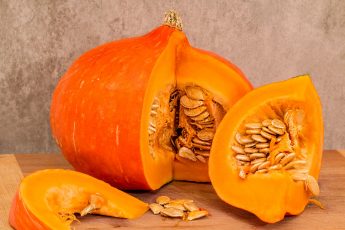Have you considered that the color of your food can signify its nutritional value? There is a reason that nutritionists and dieticians tell everyone to choose bright-colored fruits and vegetables to implement into their diets.
You hear of the benefits of leafy greens, but what about orange vegetables? You know that orange fruits such as mangoes, oranges, and apricots have plenty of nutrients. The same goes for orange vegetables.
You can say that orange fruits and vegetables are excellent for your eye health, and immune system and are also great for your cardiovascular health. They are also good for your skin.
Let’s take a good look at some orange vegetables that you should include in your diet and why they are beneficial for you!
Orange Vegetable List
 Carrots
Carrots
The first thing that people think of when they imagine orange vegetables are carrots. That is because they are the most obvious ones and are the first ones that pop into your head when you think of them. However, carrots are known to have many health benefits, including being excellent for your eyesight since they contain Vitamin A and beta carotene.
Carrots also contain Vitamin K and calcium, which is perfect for your bone health as well. Another reason carrots are great for you is that they have properties that help you control blood sugar levels.
Therefore, they may contain some natural sugar, but they are a thumbs-up vegetable for assisting those who maintain their blood sugar levels to a good number.
Sweet Potatoes
Sweet potatoes also have plenty of excellent health properties, including beta carotene, which is why they have an orange color. They also have Vitamin A, niacin, riboflavin, thiamin, and Vitamin B5.
They also contain other medicinal properties such as anti-inflammatories and properties to help control blood sugar levels, and one sweet potato a day can help reduce the risk of you developing diabetes – which also depends on the rest of your diet.
However, sweet potatoes are not only good for your eyesight and immune system, but they are also excellent for your hormones and reproductive system. They are another superfood that you want to include in your diet.
Yams
Aren’t sweet potatoes and yams the same thing? Actually, not at all. Both root vegetables are orange in color. However, the skin of yams has the appearance of tree bark. On the other hand, the skin of sweet potatoes is much smoother and thinner. Yams also taste and look more like yucca, and their flesh is starchy and not sweet in the same way as sweet potatoes are.
Yams have plenty of excellent nutrients like sweet potatoes as they have properties to help stave off cancer and diabetes. They also contain healthy fats to help with brain function and hormone regulation. Additionally, they can help reduce inflammation and help keep blood sugar levels at a reasonable number.
They also contain plenty of fiber like the other orange vegetables that can only help keep you full. The great thing about yams is that they have more dietary fiber as they help fill you quicker. Therefore, a baked yam with a touch of brown sugar and a small butter is a tasty side dish.
Pumpkin
Pumpkin may be a fruit, technically, but it also blends in the vegetable category as it has a vegetable-like flavor. You can make scary-looking Jack-O-Lanterns out of pumpkins on Halloween, but their nutritional benefits are anything but scary. Pumpkins have plenty of nutrients such as beta carotene and Vitamin A, which are excellent for your eyesight.
Additionally, they contain plenty of antioxidants that help fight cancer and free radicals. They have properties that can help strengthen cardiovascular health and help boost your immune system.
The pumpkin’s flesh is also healthy for you when it comes to weight loss as they contain few calories and loads of nutrients. Therefore, pumpkin should be part of anyone’s diet whether you plan to take off some inches from your body or not.
Squash
Squash can be yellow, but it is often orange. This vegetable has plenty of excellent and powerful nutrients such as Vitamins A, B6, and C. Additionally, squash contains plenty of phosphorus, riboflavin, potassium, magnesium, folate, and fiber. Therefore, squash can help improve your eyesight, cardiovascular health, immune function, bone health and help control your blood sugar.
In addition, squash has plenty of antioxidants that can help reduce cancer and other chronic illnesses. In soup form, squash is delicious, and there are many recipes for that type of soup. However, it is essential to include this superfood in your diet.
Check out our blog to know more about vegetables and fruits.
Conclusion
You may wonder about the importance of color when it comes to food, but vibrant colored fruits and vegetables have plenty of powerful nutrients. That is why health professionals such as dieticians and nutritionists stress the importance of including colored vegetables‘ and fruits into your diet.
As you can see, orange-colored vegetables have plenty of essential nutrients and minerals that not only keep you healthy but can help boost your eyesight. The beta carotene in orange fruits and vegetables helps with the improvement of vision and overall immune function.
Therefore, the next time you are in the mood for a snack, enjoy a few carrot sticks with some dip!
Interested in finding out the tips and tricks to have the garden of your dreams? Check out our website.



